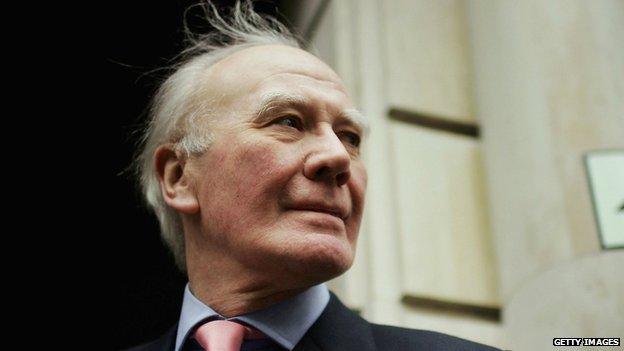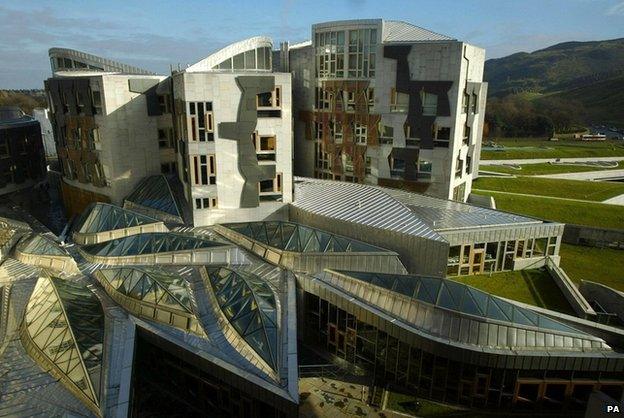Scottish independence: Gordon Brown outlines 'power-sharing' UK
- Published
- comments
Gordon Brown: "We've got to find a way of working together again. We cannot have this permanent stand-off"
Former prime minister Gordon Brown said Holyrood should be given more control over tax as part of a power sharing plan between London and Edinburgh.
He called for a move away from the current system in favour of a constitutional partnership of nations.
Senior Lib Dem Sir Menzies Campbell said there was a consensus to devolving more financial powers to Holyrood.
The Scottish government said only independence would give Scotland the powers it needed to flourish.
Speaking in Glasgow ahead of the 18 September independence referendum, Mr Brown argued for a move away from a centralised British system to one where nations shared power, risk and resources.
Nicola Sturgeon: "The only way we can secure new powers is to vote yes in the referendum"
He told the audience: "We need to build the future of the relationship between Scotland, England and the rest of the United Kingdom.
"I believe there are six constitutional changes we have got to make for a better relationship between Scotland and the rest of the United Kingdom, to turn what I would call a unitary and centralised state of the past into a partnership of equals and one where there is power-sharing across the United Kingdom."
Scotland is already due to receive new powers over income tax from April 2016, when the UK Treasury will deduct 10p from standard and upper rates of income tax in Scotland, giving MSPs the power to decide how to raise cash.
But Mr Brown suggested letting the UK government decide the first 5p of income tax and giving responsibility over the next 15p to Scotland was a "fair way" of raising 40% of the revenue of the Scottish Parliament in Scotland.
The Kirkcaldy and Cowdenbeath MP and former chancellor's six changes would involve:
A new UK constitutional law to set out the purpose of the UK as pooling and sharing resources for the defence, security and well-being of the citizens of all four nations
A constitutional guarantee of the permanence of the Scottish Parliament
A new division of powers between Scotland and Westminster that gives Holyrood more powers in employment, health, transport and economic regeneration
A new tax sharing agreement that balances the commitment of the UK to pool and share its resources with the need for accountability to the electors in all the places where money is spent
New power-sharing partnerships to address shared problems on poverty, unemployment, housing need and the environment
A "radical" transfer of powers downwards from Westminster and Edinburgh to local communities
Mr Brown's proposals are being submitted to the Labour Party's devolution commission, which is looking into strengthening the Scottish Parliament's powers.
The Scottish Conservatives have also been examining the issue of increasing the powers of the Scottish Parliament.
Meanwhile, Sir Menzies, who has been tasked with finding a consensual cross-party alternative to independence, published the Campbell II report, external, drawing together the arguments of the other parties on devolution.
The former Liberal Democrat leader said there was growing consensus that the Scottish Parliament's financial powers should be expanded to make it responsible for raising the taxes to pay for most of the money it spends, and that the institution should be entrenched permanently.

Sir Menzies Campbell has issued an update on his commission on devolving powers
Speaking in Edinburgh, the North East Fife MP said: "Today's report makes a series of rational, reasonable and indeed radical recommendations by which this reform could take place. Equipping Scotland with more powers, what I regard as an early step for a federal UK, can be done.
"2015 is the time when it should be done. To give a stable future for Scotland and the UK it must be done.
"The proposals in this report will bring people together after the referendum. It is a radical programme for change."
Sir Menzies Campbell: "There are opportunities to set out reasonable sensible, rational and indeed radical alternatives."
The Campbell II report made seven recommendations:
The 2015 Queen's Speech should include provisions to strengthen Scotland's powers
Political parties should commit to this in their UK election manifestoes
The UK government should look at all options to make the plans a reality
The Scottish government should make available its referendum research to inform the Campbell II proposals
The Scottish Parliament should ensure Scotland's new fiscal body can cope with further devolved financial powers after a referendum "No" vote
The Secretary of State for Scotland should convene a meeting within 30 days of a "No" vote to secure consensus for the devolution of more powers
Further devolution of tax powers should be made through a further Scotland Act
The Democrat Home Rule Commission, chaired by Sir Menzies, previously backed a substantial transfer of financial and constitutional power, external to Holyrood in a report in October 2012.

All of Scotland's political parties have been considering how best to enhance the powers of the Scottish Parliament
Deputy Scottish First Minister Nicola Sturgeon said of the plans: "I don't think there looks to be any chance at all of that happening.
"And, unless people know what more powers we would be guaranteed to get, whichever of these parties wins the next UK election, then how on Earth can people be expected to take it seriously?"
Ms Sturgeon added: "There's a pattern here, where the Westminster parties, when they're in a position to deliver more powers, fail to do so.
"Then, with the threat of a referendum and a 'Yes' vote, they suddenly start to decide that they're in favour of all of this anyway."